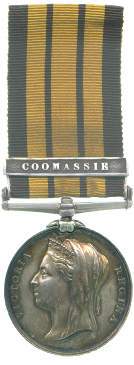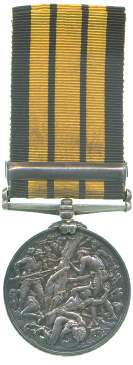Current Location: In storage
Maker(s)
Mint:
London
Artist:
Wyon, Leonard Charles
Artist:
Poynter, Edward John
Ruler:
Victoria (1837-1901)
Ruler:
Victoria regina
(With the title of)
Entities
Categories
Description
The Ashanti Confederacy, which had occupied an area somewhat larger than modern Ghana since c. 1750, was a major opponent of British expansion in western Africa for the duration of the nineteenth century. A thirty-year peace agreed in 1831, which accorded the British control of most of what would become their Gold Coast colony, failed to prevent repeated border disputes and minor infractions across the Pra River.
Matters began to escalate in 1872, when the port of Elmina, which had been the first European settlement in West Africa and was the Confederacy's principal trading point with the European world, was transferred from the Dutch West India Company (who had captured it from Portugal in 1637) to the British coastal colony. King Kaofi Kalkali (usually spelt Coffee) of the Ashanti, who had previously effectively controlled the port, made things sufficiently difficult for its new rulers that in 1873 General Sir Garnet Wolseley, a veteran of the Crimea and the Indian Mutiny, was sent with a large force that in 1874 invaded Confederacy territory and sacked the capital, Kumase. Although they had to withdraw, African reinforcements for the British convinced King Kaofi to surrender. After this the British territory along the coast was expanded and formalised as the Gold Coast colony. Another war with the Ashanti Confederacy resulted in the deposition of its king and the installation of a British Governor in 1896, and further and final fighting in 1900.
This medal was awarded to Private J. Martin of the 2nd Battalion, Rifle Brigade, for his participation in the 1874 campaign, and the bar indicates his presence at the sack of Kumase. Lester Watson acquired the medal at some point before 1928.
Notes
History note: Gift of L. Hoyt Watson; ex Lester Watson Collection, acquired before 1928
Legal notes
Given by Lester Watson through Cambridge in America, 2009
Measurements and weight
Diameter: 36.5 mm
Weight: 41.82 g
Acquisition and important dates
Method of acquisition: Given
(2009)
by
Watson, Lester
Dating
Production date:
AD 1874
Materials used in production
Silver
Techniques used in production
Struck
Inscription or legends present
Inscription present: Bust of Victoria facing left with veil
- Text: VICTORIA REGINA
- Location: Obverse
- Type: Design
Inscription present: Scene of bush fighting around tree with fallen African to fore
- Location: Reverse
- Type: Design
References and bibliographic entries
Identification numbers
Accession number: CM.1455-2009
Primary reference Number: 141549
Watson Catalogue: 378
Ordering: M-0338
Previous object number: LW.0338
Stable URI
Audit data
Created: Saturday 6 August 2011
Updated: Monday 25 March 2024
Last processed: Friday 16 May 2025
Associated departments & institutions
Owner or interested party:
The Fitzwilliam Museum
Associated department:
Coins and Medals





